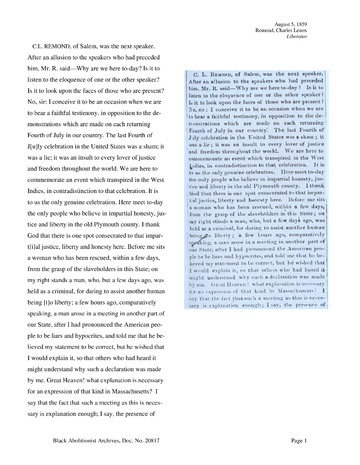
Speaker or author: Remond, Charles Lenox, 1810-1873
Newspaper or publication: Liberator
Impassioned speech defending the speaker's assertion that the U.S. government is composed of "liars and hypocrites" who dare to celebrate the July 4th freedom of a nation which continues to hold millions of enslaved people.
Description of file(s): PDF 3 page, 806 word document (text and images)
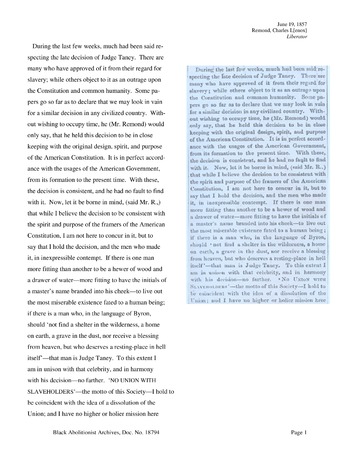
Speaker or author: Remond, Charles Lenox, 1810-1873
Newspaper or publication: Liberator
Speech delivered denouncing the legal decision made by Judge Taney. The speaker encouraged his audience to adopt the motto, "No Union with Slaveholders." He said he would rather see the union divided than to give up the fight for freedom and the cause of human liberty.
Description of file(s): PDF 4 page, 960 word document (text and images)
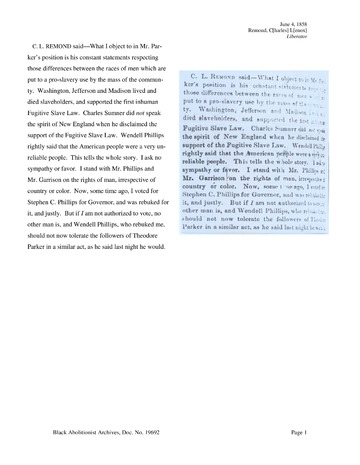
Speaker or author: Remond, Charles Lenox, 1810-1873
Newspaper or publication: Liberator
The speaker noted that Washington, Madison, and Jefferson were all slave holders. He objected to the previous speaker's distinction between pro-slavery men and anti-slavery men since some politically anti-slavery men had been themselves slaveholders.
Description of file(s): PDF 1 page, 175 word document (text and image)
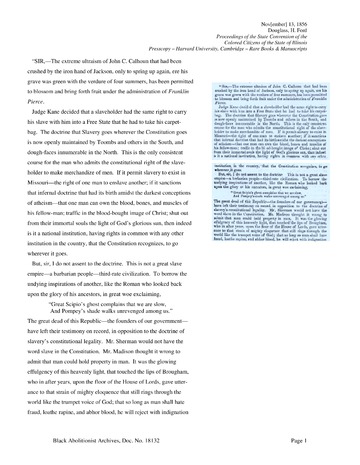
Speaker or author: Douglass, H. Ford
Newspaper or publication: Presscopy -- Harvard University, Cambridge -- Rare Books & Manuscripts
Speech discussing the politics of slavery stressing the influence of government and political figures in continuing the institution.
Description of file(s): PDF 3 page, 1,045 word document (text and images)
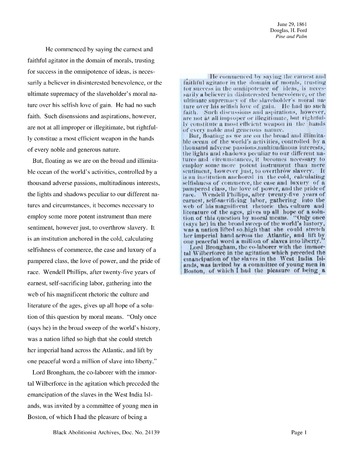
Speaker or author: Douglass, H. Ford
Newspaper or publication: Pine and Palm
The speaker said he believed the first element of success for African Americans was establishing a "nationality." His approach to the abolition of slavery was philosophical. Slavery was not rational in his view and slaveholders, he believed, must come to realize this.
Description of file(s): PDF 5 page, 1,294 word document (text and images)
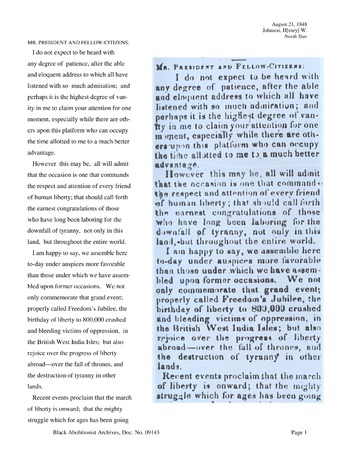
Speaker or author: Johnson, Henry W., abolitionist
Newspaper or publication: North Star
Speech delivered during a celebration of the August 1st emancipation of the British West Indies. The speaker stresses the plight of those still enslaved in this country but is encouraged by events that he sees must lead the U.S. to emancipation.
Description of file(s): PDF 24 page, 5,038 word document (text and images)
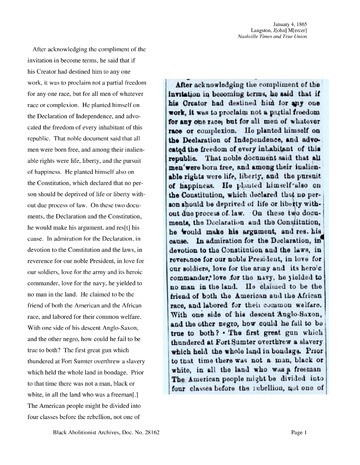
Speaker or author: Langston, John Mercer, 1829-1897.
Newspaper or publication: Nashville Times and True Union
Speech delivered before a mixed race audience in the House of Representatives. The speaker stressed his hope for a brighter future for the former slaves. He spoke of the injustice suffered by slaves over the years since slavery was first established in the U.S. He paid special attention to the contributions and sacrifices that African Americans had made to the country, and his hope for future racial harmony.
Description of file(s): PDF 9 page, 2,243 word document (text and images)
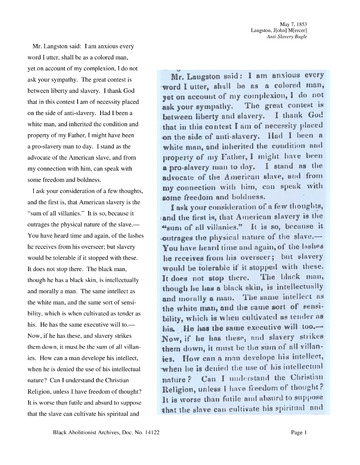
Speaker or author: Langston, John Mercer, 1829-1897.
Newspaper or publication: Anti-Slavery Bugle
Speech regarding the inhumanity of slavery, emphasizing the government backing the institution of slavery receives that keeps it strongly in place.
Description of file(s): PDF 4 page, 973 word document (text and images)
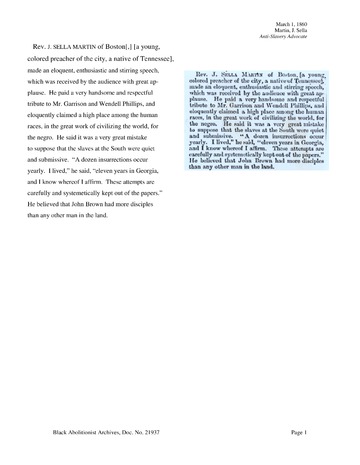
Speaker or author: Martin, J. Sella (John Sella), b. 1832
Newspaper or publication: Anti-Slavery Advocate
Brief speech praising the work of William Lloyd Garrison, Wendell Phillips, and John Brown. The speaker said that just because there is no news of discontent from the slaves in the South does not mean that they are happy with their situation.
Description of file(s): PDF 1 page, 134 word document (text and image)
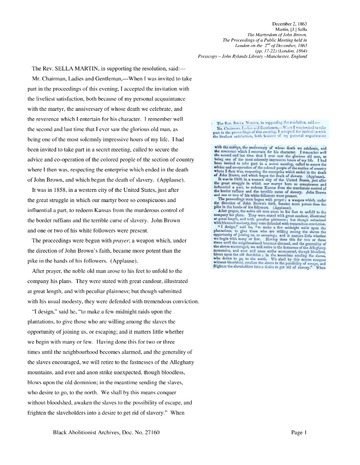
Speaker or author: Martin, J. Sella (John Sella), b. 1832
Newspaper or publication: Presscopy -- John Rylands Library -- Manchester, England
Speech given on the anniversary of the execution of John Brown. The speaker related his experience with John Brown, and praised him as a martyr for the abolition of slavery. He also praised other abolitionists and stressed that the incident at Harper's Ferry was the spark that fueled the current fight to completely end slavery.
Description of file(s): PDF 7 page, 2,698 word document (text and images)
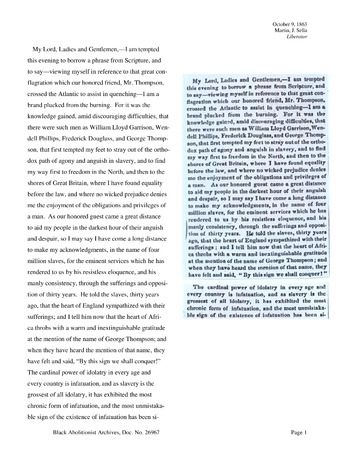
Speaker or author: Martin, J. Sella (John Sella), b. 1832
Newspaper or publication: Liberator
The speaker appealed to the people of Great Britain for their support in the fight for emancipation in the U.S. He explained a bit of what was happening in the U.S. regarding the war, and focused on the issue of slavery and the strides being made by the anti-slavery movements there.
Description of file(s): PDF 14 page, 4,006 word document (text and images)
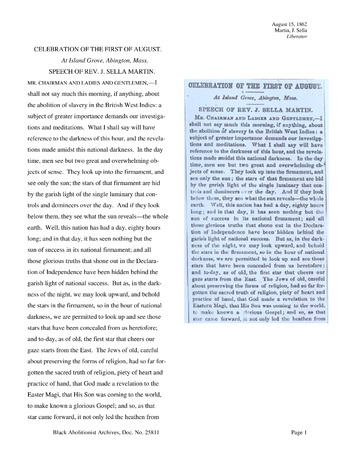
Speaker or author: Martin, J. Sella (John Sella), b. 1832
Newspaper or publication: Liberator
Sermon delivered during a celebration of the anniversary of the emancipation of the British West Indies. The speaker emphasized the error in moral judgment made by a country that condoned laws like the Fugitive Slave Law. He compared the plight of the slaves in the U.S. with that of slaves in ancient Egypt. He noted that the poor whites were not treated any better than the slaves were regardless of their skin color. The war for freedom was, to the speaker, a holy war for human liberty.
Description of file(s): PDF 15 page, 4,523 word document (text and images)
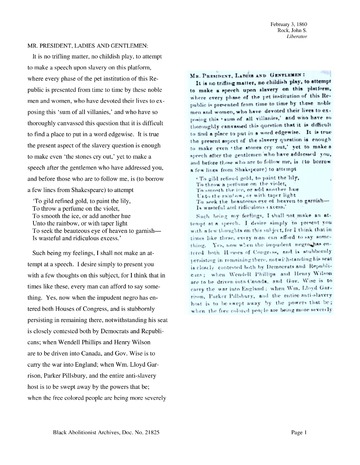
Speaker or author: Rock, John S. (John Sweat), 1825-1866
Newspaper or publication: Liberator
Speech addressing the current question of "what is to be done with the free colored people?" At the time, there were several issues regarding what would happen to the country if the slaves were set free. The speaker addressed the national fears; amalgamation; ideas regarding colonization or "removal"; and irrational concerns about violence. He assured his audience that both races were capable of living together in harmony.
Description of file(s): PDF 18 page, 5,281 word document (text and images)
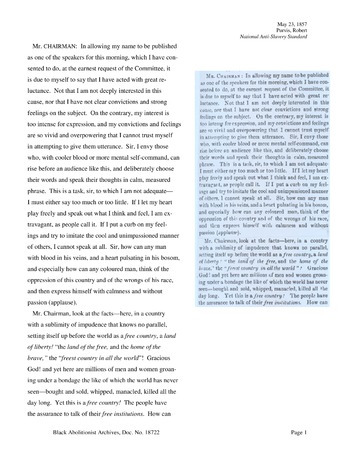
Speaker or author: Purvis, Robert, 1810-1898
Newspaper or publication: National Anti-Slavery Standard
Speech denouncing the Fugitive Slave Law, emphasizing the lack of representation and civil rights of African Americans in the structure of U. S. government.
Description of file(s): PDF 5 page, 1,537 word document (text and images)
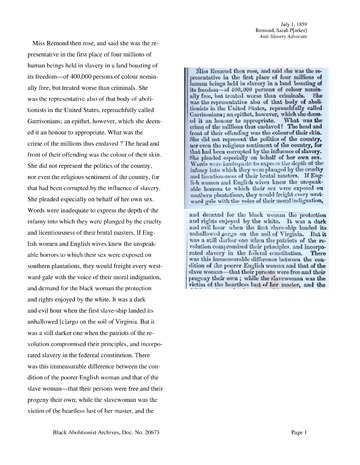
Speaker or author: Remond, Sarah Parker, 1826-1887?
Newspaper or publication: Anti-Slavery Advocate
The speaker stressed the plight of women and children subjected to slavery in the southern states. She spoke before an English audience in London and pleaded for their assistance in the battle for emancipation in the U.S.
Description of file(s): PDF 2 page, 588 word document (text and images)
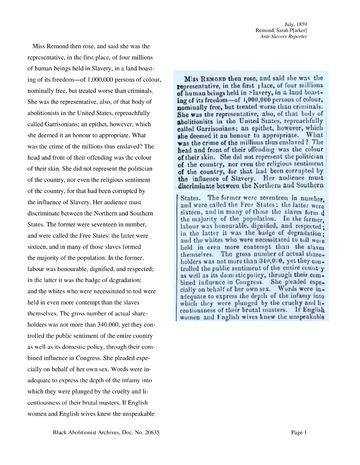
Speaker or author: Remond, Sarah Parker, 1826-1887?
Newspaper or publication: Anti-Slavery Reporter
The speaker stressed the plight of women and children subjected to slavery in the southern states. She spoke before an English audience in London and pleaded for their assistance in the battle for emancipation in the U.S.
Description of file(s): PDF 3 page, 761 word document (text and images)
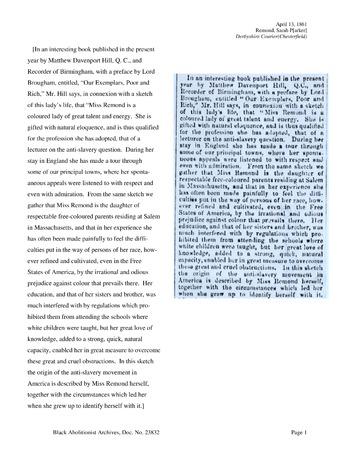
Speaker or author: Remond, Sarah Parker, 1826-1887?
Newspaper or publication: Derbyshire Courier
Overview of a speech delivered before an English audience regarding the plight of the slave in America, a country founded on freedom. The speaker offered anecdotes from her own life and the lives of slaves to demonstrate the cruelty and inhumanity of slavery. She asked for the support of the English people in the fight for universal emancipation.
Description of file(s): PDF 9 page, 2,329 word document (text and images)
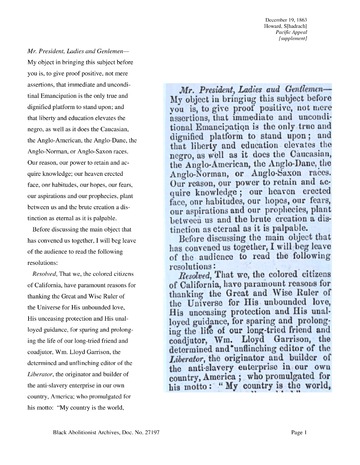
Speaker or author: Howard, Shadrach
Newspaper or publication: Pacific Appeal [supplement]
Lengthy speech denouncing slavery and praising the work of abolitionists. The speaker offered the emancipation of the British West Indies as an example of the successful work of various abolitionists.
Description of file(s): PDF 17 page, 3,761 word document (text and images)
(page1).jpg.jpg)
Title: Voice of the Fugitive - July 29, 1852
Speaker or author: editor
Newspaper or publication: Voice of the Fugitive (1851 - 1852)
Beginning with an overview of a recent convention in Maine, the writer briefly summarizes state by state newspaper articles describing the current political position on the issue of slavery.
Description of file(s): two scanned, two columned, newspaper pages
(page1).jpg.jpg)
Title: Voice of the Fugitive - November 18, 1852
Speaker or author: editor
Newspaper or publication: Voice of the Fugitive (1851 - 1852)
Brief announcement that Gerrit Smith has been elected to Congress.
Description of file(s): one scanned newspaper column
(page1).jpg.jpg)
Title: Weekly Anglo-African - April 26, 1862
Speaker or author: editor
Newspaper or publication: Weekly Anglo-African (1859 - 1862)
The writer comments on a letter Gerrit Smith sent to the Postmaster General regarding the Civil War, military activities, race relations, and the end of slavery.
Description of file(s): two scanned newspaper pages (three columns)
(page1).jpg.jpg)
Title: Weekly Anglo-African - December 31, 1859
Speaker or author: editor
Newspaper or publication: Weekly Anglo-African (1859 - 1862)
Political tensions grow between the North and the South. The writer includes quoted threats from Virginia's Governor Wise to hang Frederick Douglass and drive the abolitionists out of the Union (or create a Confederacy).
Description of file(s): one scanned, three columned, newspaper page
(page1).jpg.jpg)
Title: Weekly Anglo-African - June 16, 1860
Speaker or author: editor
Newspaper or publication: Weekly Anglo-African (1859 - 1862)
The writer discusses the return of Frederick Douglass as chief editor of his newspaper publication.
Description of file(s): two scanned newspaper pages (three columns)
(page1).jpg.jpg)
Title: Weekly Anglo-African - March 22, 1862
Speaker or author: editor
Newspaper or publication: Weekly Anglo-African (1859 - 1862)
The writer discusses a proposal for emancipation that Abraham Lincoln sent to Congress. This represents the first legislative step towards the abolition of slavery and the realization of freedom for millions of slaves.
Description of file(s): two scanned, two columned, newspaper pages
(page1).jpg.jpg)
Title: Weekly Anglo-African - March 31, 1860
Speaker or author: editor
Newspaper or publication: Weekly Anglo-African (1859 - 1862)
The writer questions the actions of Church leaders who gave permission for a lecture to be delivered in their church only to later deny the event without explanation.
Description of file(s): two scanned newspaper pages (three columns)



